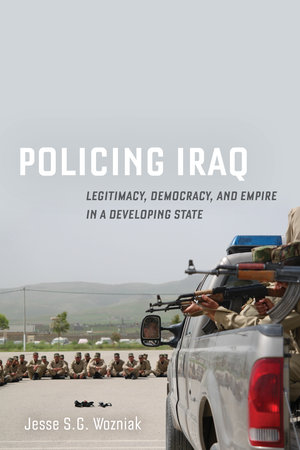By Jesse Wozniak, author of Policing Iraq: Legitimacy, Democracy, and Empire in a Developing State
During my first research trip to the Lead Police Training Academy on the outskirts of Sulaimaniyah, Iraq, I observed a class of recruits on their last day of training finally get their highly anticipated turn on the firing range. As row after row of students came to the small overhang to line up and fire their requisite 15 bullets, it was immediately evident things were not going well. Few were able to hit the designated areas on the targets, while several failed to hit the targets at all. When I asked the trainer in charge of the gun range what the purpose of this meager training was, he explained there wasn’t money in the budget for enough bullets to actually train the recruits how to use their weapons, so he just wanted them to know what it feels like to shoot a gun. Later that afternoon, the students all graduated and were dispersed to policing positions throughout the region.
In my decade-plus of studying the reconstruction of the Iraqi police force, this moment remains emblematic of a process that seems designed to do anything but create a democratic police force. My book, Policing Iraq: Legitimacy, Democracy, and Empire in a Developing State, demonstrates how the reconstruction of the police force serves as a microcosm of the reconstruction writ large. The training police receive is woefully inadequate and inappropriate for policing a democratic state, while dire budget constraints actively hamper their ability to perform basic policing services. Their lack of effectiveness means they have been able to garner little legitimacy among the citizenry, who regularly turn to nonstate organizations for policing services or simply take matters into their own hands. As this central government agency is unable to fulfill its duties or gain the respect of its constituents, it further hampers the legitimacy and effectiveness of the already beleaguered governments in the Iraqi state.
At the most basic level, the modern democratic state needs to produce both effective state organizations and legitimacy for its actions. Police are central to both, as their ability to fulfill their many functions in a fair and legitimate manner is a crucial factor in the strength of a democracy and the quality of life enjoyed by its citizens. Police are the front lines of the state, where rights are truly maintained or disregarded. Indeed, there is an old Iraqi saying which roughly translates to “laws are merely ink on paper,” neatly capturing the central argument of my book – no other group has the immediacy and material impact of the police.
This is even more so the case in Iraq, where almost overnight the tightly controlled despotic order of the Saddam Hussein regime was replaced by a near complete absence of government. It is difficult to imagine an already stable, developed state maintaining legitimacy for long with its government functions filled by a multitude of distinct, unconnected, and often hostile private interests. As one lawyer I spoke with explained, “Once we had one Saddam to deal with. Now we have dozens.” This sentiment was echoed by a number of my respondents, and showed the absence of legitimated government and the frenzied attempts to fill that void by a variety of non-state actors. Because the police can and do touch on so many aspects of civil society and the lives of citizens, they become an integral way of consolidating and maintaining state power. Without a rationalized police force filling the manifest goals of crime control and public order maintenance along with the latent goals of state consolidation and legitimacy building, it becomes a nigh-impossible task to construct a legitimate state.
Contemporary Iraq vividly demonstrates this, as the lack of formal social control combined with drastically reduced state expenditures left a major vacuum waiting to be filled by anyone who can deliver what is normally expected of the state. In this case, the major power and service vacuums across the nation of Iraq were eventually filled by the Islamic State, who run a “parallel administration” of their form of government, replete with taxes, schools, the provision of necessities, and centrally, their own form of criminal justice. While the rise of IS is due to a wide variety of factors, a central facet of their rise to power came through providing the material necessities, security, and safety the legitimate Iraqi state is either unable or unwilling to provide.
The failure on behalf of those leading the reconstruction of Iraq to recognize the importance of establishing meaningful state legitimacy through the fostering of effective state institutions helps explain why conditions in Iraq have failed to improve despite the massive resources and personnel poured into the reconstruction effort. This case can also help us understand why US efforts to export democracy by force in other locations, notably Afghanistan, have gone so poorly. Those leading these reconstruction efforts have clearly failed to grasp the centrality of establishing legitimacy through providing competent and effective government services. As such, they have directly undermined their own efforts while paving the way for violent nonstate actors to fill the voids of effectiveness and legitimacy to build their own competing governments.



